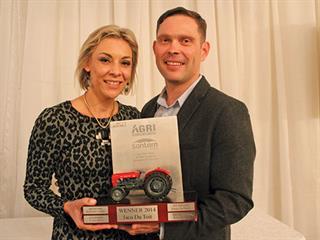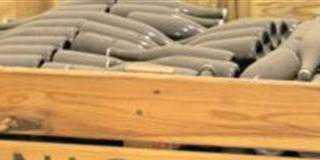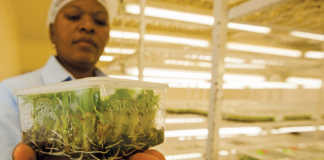
Jaco du Toit, capped the top farmer under the age of 35 in the Western Cape this year, is an innovator and problem solver. And as soon as he finds a better way around a problem, he eagerly shares his newfound knowledge with other table grape farmers. Jaco, who farms with table grapes on 41ha in Sandhills, near De Doorns in the Breede Valley, believes that sharing information ensures the fastest progress and that helping the industry to progress is ultimately beneficial to all.
“The more information I share, the more I get back,” he says.
Jaco admits that he is always looking for new challenges and projects. His latest achievement was to find a way of speeding up the cooling process for table grapes – by modifying the design of the packaging material. “Because I shared this information, 90% of the farmers in the area have already bought into the idea,” he adds enthusiastically. “I think the younger generation of farmers are more open and willing to share their knowledge and experience with other farmers.”
Planting for the future
Jaco is the third generation of his family to farm on Meerlust Plase, a property at the foot of the Hex River Mountains, and his careful farm management planning is always done with the next three generations in mind. “I’m more concerned with making a big contribution in terms of leadership and innovation,” he says.
READ MORE: Ingenuity & innovation at Nampo
Jaco’s constant drive to improve has also been the driving force behind a total replanting of vineyards on his farm. Since becoming managing director of the family farm in 2000, he has brought down the average age of vineyards to less than seven years. “My greatest challenge has been to replace all the old varieties we had on the farm with new, seedless grapes,” he explains. Since last year, Meerlust Plase has produced only seedless grapes.
About 53% of the grapes planted are red, 25% white and 22% black. The largest planted variety, accounting for 50% of all grapes planted on the farm, is Crimson Seedless. Others include Autumn Royal (black), Sugra 35 (white), Sugraone (white), Sundance (white), Desert Dawn (red), Regal (white) and Sugra 34 (black).
According to Jaco, when table grape farmers choose new varieties, the main focus is on higher yield, less labour, and fewer risks. Producers prefer grape varieties with loose bunches, uniform berry sizes, and naturally large berries that require minimal use of growth regulators. They should also allow spur pruning and require minimal chemical application.
Developing new varieties
Jaco has a trial block on the farm and is actively involved in evaluating new varieties. He is part of a core working group to support the Agricultural Research Council’s (ARC’s) breeding programme for new table grape varieties. He stresses that the local industry needs to develop varieties that will be acceptable in several markets. It is also important to plant a range of varieties, including red, white and black grapes, with early to late season ripening times. Some of the main parameters for new varieties include a high yield of between 25t/ha and 30t/ha, quality that ensures a 90% pack-out, and a good storage ability.
According to Jaco, some of the most promising new cultivars are Joybells, Sugra 34, Sugra 35 and G3-4832. The latter, a late-season, red seedless variety, is locally bred by the ARC. Joybells is also a red seedless, ARC-bred variety. It is a high-yielding, early-season grape with good storage capabilities.
‘Think like vines’
Jaco spent three years at the Elsenburg Agricultural Training Institute in Stellenbosch obtaining a diploma in table grape production. He remembers one of his lecturers insisting that the students should start thinking like vines. He was trying to convey the message that vines should be allowed to grow and develop as naturally as possible. This is certainly the method that has been adopted by Jaco. He has a minimalist approach, which is evident in the way that soil is managed on the farm. “Our aim is always simplicity and sustainability and in 2000 we started to intensively invest in improving the quality of our soil,” Jaco says.
He started with an integrated approach that included sowing korog as a cover crop between tractor tracks in between rows, and applying compost and compost tea (made on the farm using bought-in materials) to enrich the soil with organic material and to increase the amount of micro-organisms. He and his team then used a mulcher to chop weeds, placing them on the planting rows.
But his approach has since been streamlined and no longer relies on the buying in of expensive compost and mulch materials. “We now use the full area between rows to grow korog, so instead of buying in organic material we grow our own,” says Jaco.
The korog also helps suppress weeds early in the season with vigorous leaf canopies doing the job later in season. “The only herbicide we use is Roundup, and we only use this on planting rows.” In keeping with his philosophy to use the minimum manual and chemical manipulations while still getting improved results, Jaco experimented with heavier hormone use. The result is that he now uses twice the average amount of gibberellic acid (Gibb) normally used by table grape farmers to boost bunch thinning and encourage bigger berry sizes.
READ MORE: Table grape farmer is Agri Wes-Cape Young Farmer 2014
Gibb is applied during bloom to cause elongation and thinning of the bunches and when berries are pea-sized, a second application of Gibb is used to enhance normal berry size. Jaco has used Gibb on white varieties such as Regal that are prone to browning, with great success. He is also one of the first table grape farmers to make use of the experimental growth regulator CPPU, which forces better fruit set.
Jaco’s appetite for risk in trying out new production methods has mostly served him well, but he has made mistakes that have left him somewhat more cautious. “I once tried to graft a new grape variety, Desert Dawn, onto Flame vines, but it didn’t work. For me, it was a calculated risk because I only tried it on a one hectare block, but I felt very bad for the two or three farmers who followed my lead, trying this out on a larger scale. That taught me to really think my ideas through properly before applying them,” he says.
Post-harvest innovation
For Jaco, improving productivity and sustainability does not start and end in the vineyard. Many of his ideas have focused on post-harvest innovation and he played a key part in developing the Smart-Weigh system – an easy-to-use, computerised scale that increases accuracy while speeding up the packaging process. Smart-Weigh, a product of Soft-Pro Information and Automation Technologies, is an electronic scale with a computer display that shows the user exactly how many berries need to be removed from a bunch or added to a pack to get to the required retail weight.
“Grapes cost the farmer about 3c per gram to produce, that is roughly 20c per berry. At such a high unit value, it really does make sense to weigh every grape,” says Jaco. He adds that research suggests farmers give away R7 worth of grapes per carton on average due to over-packing. By using packaging technology such as the Smart-Weigh system, farmers can ensure they get paid for every last grape. The system is designed for use by workers with low literacy levels and it can help speed up the packing process by up to 30%.
Jaco’s zeal for post-harvest innovation has seen him make changes to the type and design of packaging material used, which has helped reduce cooling time and curb botrytis damage on grapes.
Better ventilation
“Grapes often suffered damage due to perspiration build-up inside the packaging. To solve this, we imported perforated bags, experimenting first with bags with 2mm perforation then 4mm and ultimately settled on 5mm laser-punched perforated bags,” he says.
Jaco explains that these bags allow for better ventilation, which helps reduce damage caused by botrytis that develops in the packaging due to excess moisture. Because there is less moisture build-up in the packaging, the bags have also allowed Jaco to do away with paper inserts inside the packaging. Meerlust Plase is the first table grape producer in recent years to do this.
Improved carton
By carefully rethinking the design of the carton in which grapes are packaged, Jaco helped develop a carton that allows better airflow into the box. This newly designed carton, in combination with the better ventilated bags and the elimination of paper inside the packaging, has seen the average cooling for grapes in cold storage being reduced by about 50%.
“Without increasing energy usage, we’ve brought cooling time to -0,5°C down from 48 hours to around 26 hours and the goal is to build on this improvement until we’re able to cool grapes down to this temperature within 20 hours. “We’re also considering the possibility of changing the prescribed cooling temperature to 1°C, which will go a long way towards cutting down on cooling time.”
Future of farming
Jaco wastes no time in responding when asked about the future of farming in South Africa, replying instead with a counter question. “Does humanity have a future? Without farming, none of us have a future. Farming will change, but it cannot stop. You need farmers every day for everything you eat and drink.”
Email Jaco du Toit at [email protected].













